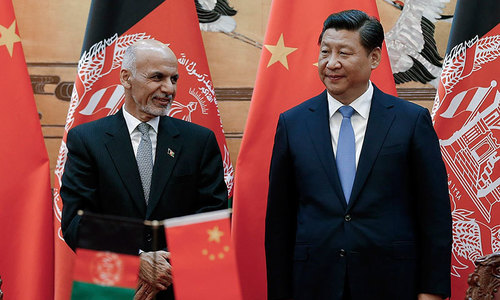ISLAMABAD: Pakistan’s exports to Afghanistan fell by a significant 27 per cent over the past one year, thanks to growing mistrust between the two countries as well as downgrade of Nato presence in the war-ravaged nation.
According to officials on Friday, the worsening law and order situation in Afghanistan over the past months was another factor that contributed to the decrease in exports.
Hundreds of people and security personnel have been killed in bomb blasts and gun attacks by militants in Afghanistan recently.
Withdrawal of Nato forces, increased trust deficit and poor security are causes of the fall
The deteriorating security situation has triggered an intermittent war of words between the two countries with Afghan officials holding Pakistan responsible for each such incident.
For the first time, the commerce ministry of Pakistan admitted that frequent closures of the Pak-Afghan border had also contributed to the steady decline in exports to the neighbouring country.
Another reason was the diversion of Afghan trade to Iran.
Pakistan’s exports to Afghanistan had reached an all-time high of $2.4bn in 2010-11. It remained over $2bn annually in the subsequent two years — 2011-12 and 2012-13. Since then, exports started to dwindle and hit $1.43bn in 2015-16.
In the first quarter of the current fiscal, exports were recorded at $362.5 million. It clearly reflects that the annual exports to Afghanistan will now be around $1bn when the figure for the 2016-17 was finalised.
Contrary to this, imports from Afghanistan have witnessed a growth of 26pc as it reached $409m in 2015-16 against $323m in the previous year.
Talks on several issues have been on the back burner for the last couple of years because of Kabul’s loss of interest in concluding a trade liberalisation regime with Pakistan.
In 2014, both sides agreed to initiate negotiation on a bilateral preferential trade agreement (PTA). Pakistan shared a draft text of the agrement with Afghanistan.
In 2015, Afghanistan conveyed to Pakistan that it would formally respond to the draft PTA latest by January 2016.
“We have not received any response so far from Afghanistan,” a commerce ministry official said.
Moreover, to encourage business-to-business interaction between the two countries, a joint business council (JBC) comprising leading businessmen from both sides was established. The first meeting of the JBC was scheduled for August 2015. When Kabul failed to send its response, a new date for the JBC meeting was scheduled — Feb 17, 2016 — in Islamabad.
According to the official, the Afghan government initially confirmed its participation in the meeting but later changed its mind. “Since then no meeting of the JBC has been planned,” the official said.
According to another official source, Pakistan has recently reminded the Afghan side to convene the 7th meeting of Afghanistan-Pakistan Transit Trade Coordination Authority (APTTCA) in Kabul as had been agreed during the last meeting held in 2016.
A similar request was also sent to Afghanistan for sharing the draft text of the amended Afghanistan Pakistan Transit Trade Agreement as was agreed in the last meeting of APTTCA held in Islamabad last year.
According to the source, both the Afghan transit and Afghan traders have suffered heavy demurrage, detention and over stay charges owing to the closure of border.
The deadlock between Afghanistan and Pakistan was due to Kabul’s insistence that India should be included in bilateral and trilateral agreements. Kabul wanted to include India in Trilateral Transit Trade Agreement — Pakistan, Afghanistan and Tajikistan. Kabul, according to officials, also wants market access to India and Saarc countries through Wagha border.
Published in Dawn, June 18th, 2017














































